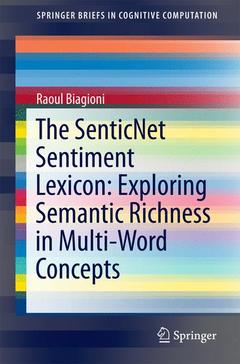The SenticNet Sentiment Lexicon: Exploring Semantic Richness in Multi-Word Concepts, 1st ed. 2016 SpringerBriefs in Cognitive Computation Series, Vol. 4

In 6 chapters the book sheds light on the comparison of sentiment classification accuracy between single-word and multi-word concepts, for which a bespoke sentiment analysis system developed by the author was used.
This book will be of interest to students, educators and researchers in the field of Sentic Computing.1. Introduction
1.1 Sentiment in Opinionated Text
1.2 Background
1.3 Research Problem
2. Sentiment Analysis
2.1 Sentiment Analysis Challenges
2.2 Levels of Analysis
2.3 Supervised vs. Unsupervised Sentiment Analysis
2.4 Linguistics-based Sentiment Analysis
2.5 Lexicon-based Sentiment Analysis
2.6 Conclusion
3.1 The Common Sense Nature of SenticNet Knowledge
3.2 A Seminal Approach to Concept-based Sentiment Analysis
3.3 Producing SenticNet
3.4 SenticNet Processes
3.5 SenticNet Knowledge: Encoding
3.6 SenticNet Access Methods
3.7 SenticNet in Numbers
3.7.1 Concept Types: Number of Words
3.7.2 Analysis of Polarity Values: Single-Word vs. Multi-Word Concepts
3.8 Conclusion
4. Unsupervised Sentiment Classification
4.1 Datasets
4.2 Classification Design and Implementation
4.2.1 Overview
4.2.2 Sentiment Classification Process
4.2.3 Polarity Value Thresholds
4.2.4 Implementation
4.3 Conclusion
5. Evaluation
5.1 Classification Performance
5.1.1 Research Question
5.1.2 Qualitative Differences Between the Datasets
5.1.3 SenticNet
5.1.4 Sentiment Analysis System
5.1.5 Sentiment Classification Design
5.2 Limitations
5.3 Conclusions
6. Conclusion
6.1 Future Work
6.2 Final Remarks
Index
Presents statistical analysis of SenticNet that has not been produced before
Offers original research into concept-level and knowledge-based sentiment analysis using the SenticNet sentiment lexicon
Broadens understanding of sentiment analysis
Includes supplementary material: sn.pub/extras
Date de parution : 06-2016
Ouvrage de 55 p.
15.5x23.5 cm
Thèmes de The SenticNet Sentiment Lexicon: Exploring Semantic... :
Mots-clés :
concepts; polarity; semantic richness; sentiment analysis; sentiment lexicon



